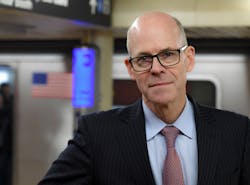MTA selects Anthony McCord as chief transformation officer
The Metropolitan Transportation Authority (MTA) has selected Anthony McCord as the chief transformation officer as the MTA undergoes a historic reorganization to improve service and modernize all aspects of operations for the first time in 50 years.
McCord is a senior executive with more than 25 years of experience in industrial services and infrastructure roles around the world, focusing on transformation and change management. McCord is expected to start in mid-December and will report to the MTA Board.
“Anthony brings a wealth of change management leadership and expertise to the MTA at this critical time in the agency’s history,” said MTA Chairman and CEO Patrick J. Foye. “Anthony will lead the implementation of the MTA’s unprecedented Transformation Plan as we work to change the way we do business and deliver New Yorkers the modern, reliable system they deserve. I’m excited to welcome Anthony to the MTA and look forward to continuing to build on the progress this team has achieved.”
McCord brings a wealth of experience and comes to the MTA following leadership positions at global companies including Veolia, Bouygues Energies & Services, the Air Liquide Group and Cryolor SA. McCord most recently worked at Veolia as the site director at the University of Montreal Health Centre, one of North America’s largest healthcare public-private partnerships where Veolia is the service provider for the 3.5 million-square-foot hospital and energy plant complex.
Previously, McCord served as CEO for the international division in the Middle East and in Canada at Bouygues Energies & Services– a global company specializing in civil engineering, infrastructure, real estate development, industrial services, media and telecommunications. McCord transformed the company’s international operations in several countries simultaneously, creating and delivering successful strategies to develop and close major contracts. His areas of focus have included healthcare, infrastructure, industrial services and finance, with diverse projects around the world.
“I’m thrilled to join the MTA at this historic moment, and to lead the authority through a complete transformation that will reimagine the largest transportation system in North America for the future,” McCord said. “I look forward to getting to work so that we can focus on delivering improved service for our 2.5 billion annual riders through the transformative work ahead of us in the upcoming Capital Plan.”
McCord graduated from the Ivey Business School of Western University in Canada in 1991 with a Master of Business Administration degree in industrial marketing and project finance. He also holds a bachelor’s degree in political science and international relations from the University of British Columbia, Canada. He currently lives in Montreal and is fluent in English and French.
McCord will bring his significant leadership experience as a change-driver to guide the MTA’s Transformation Plan. The plan was approved by the MTA Board in July 2019 following an extensive evaluation process that made key recommendations including:
- The MTA should refocus agencies on service delivery, core safety, operations and maintenance activities and centralize all support functions.
- The MTA should centralize all capital-related functions across MTA into a new central group responsible for planning, development and delivery of a Capital Program that improves service, the customer experience and accountability.
- The MTA should create a new central engineering function reporting to a new chief engineering officer to set standards, ensure quality and sustainability of infrastructure. A new central engineering group reporting to a chief engineering officer will establish clear engineering and maintenance standards to be executed consistently across all agencies.
- The MTA should create a new central customer communication function to provide high-quality and consistent customer engagement led by communications specialists.
- The MTA should centralize all operating support functions (i.e., operating standards, maintenance, repair and service design) focusing agencies on service delivery. Currently each MTA agency has its own internal operations standards and service design capabilities, which would be better managed under one integrated function serving all agencies.
- The MTA should create a centralized human resources department focused on attracting, developing and retaining the talent required to improve MTA performance and service delivery. Additionally, common functions such as legal and procurement should also be centralized and streamlined.
To drive the transformation, the MTA will require a selection of new leadership roles and capabilities including a chief operating officer, chief accessibility officer, chief people officer, director of research and development, chief procurement officer, director of quality assurance and chief technology officer.
The MTA Transformation Plan was mandated by New York State legislation passed this year to enact reforms to end waste, fraud and abuse. The plan is based on recommendations by a third-party expert, AlixPartners, to identify needed changes to leadership, business activities and processes and cost-cutting opportunities.
McCord’s selection is subject to board ratification in November.
